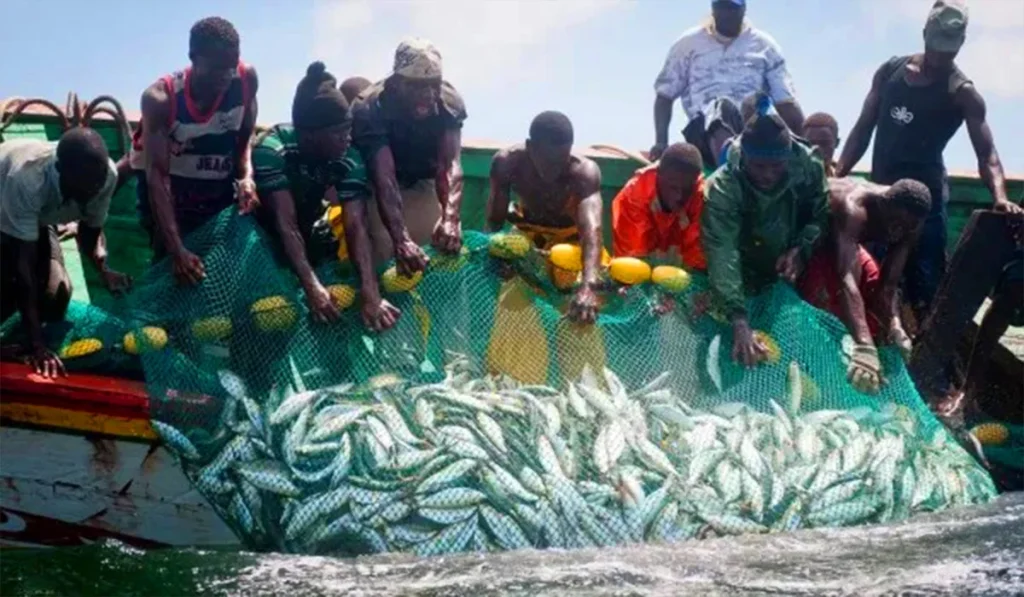By Nurture Nature Foundation (NNF)
For decades, Ghana’s seas have fed its people, sustained its culture, and provided dignity to its coastal communities. The sight of fishing canoes lining the shore at dawn, the sound of paddles cutting through the water, the smell of fresh fish smoking on the fire—these are not just daily rhythms but symbols of identity. Yet beneath these familiar scenes lies a growing crisis. Fish stocks have plummeted. Illegal fishing practices have flourished. Nets return more often with plastic waste than with fish. Families that once lived securely from the sea now face hardship.
It is against this backdrop that the passage of the new Fisheries and Aquaculture Bill arrives, offering hope of renewal. For many, this Bill represents not just legislation but a lifeline. It is designed to confront the longstanding menace of illegal, unreported, and unregulated (IUU) fishing, to restore fairness for artisanal fishermen, and to expand Ghana’s aquaculture potential. If fully implemented, it could transform the sector from one of decline to one of resilience.
The Bill’s provisions strike at the heart of Ghana’s fisheries problem. For too long, industrial trawlers have roamed the waters unchecked, engaging in destructive practices like “saiko,” where catches are transferred at sea and sold illegally. Light fishing, dynamite fishing, and the use of undersized nets have ravaged ecosystems and robbed artisanal fishermen of their livelihoods. By tightening licensing requirements, imposing stricter penalties, and strengthening monitoring and enforcement, the Bill promises to stem these destructive practices. For fishermen in Elmina, Sekondi, Ada, and Jamestown, this offers not only hope of better catches but a restoration of dignity.
Equally important is the Bill’s emphasis on aquaculture. Ghana’s inland waters, particularly Lake Volta, hold enormous untapped potential for sustainable fish farming. At a time when marine stocks are under immense pressure, aquaculture provides a pathway to feed the population, create jobs, and diversify income sources. With proper regulation and investment, Ghana could become a net exporter of fish rather than a struggling importer. This shift would reduce food insecurity, stabilize prices, and position the country competitively in regional markets.
But while the passing of the Bill is a milestone, the true measure will be in its implementation. Laws on paper mean little if not matched with resources, transparency, and accountability. Patrol boats must be funded. Licenses must be issued fairly and openly. Training and financial assistance must reach fishermen to help them adapt to sustainable methods. Aquaculture projects must be supported with infrastructure and research, not left to flounder.
Peter Asiedu, Executive Director of Nurture Nature Foundation, put it bluntly:
“The passing of this Bill is historic, but let us be clear: a law on paper does not change lives until it is enforced. For too long, our fisherfolk have watched their livelihoods destroyed by illegal trawlers, their nets filled with plastic, and their dignity eroded. This Bill gives them hope—but only if government matches words with action. We need adequate funding for monitoring and patrols. We need transparency in licensing to root out corruption. We need training and financial support to help fisherfolk transition to sustainable practices. And we must invest in aquaculture infrastructure to unlock its full potential. This is more than an environmental Bill—it is a lifeline for food security, for jobs, and for the very culture of our coastal communities. Ghana cannot afford to let this opportunity slip away.”
The experience of other nations shows what is possible. Namibia rebuilt its fish stocks by introducing strict anti-IUU laws coupled with community involvement. Norway and Iceland have demonstrated that sustainable fisheries management can go hand in hand with profitability. If Ghana follows through on the promises of this Bill, it too can reverse decline and chart a course of sustainability.
The stakes are immense. Fish provides more than 60 percent of animal protein consumed in Ghana. Millions depend directly or indirectly on fisheries for their livelihoods. Beyond economics, fishing is embedded in our culture, festivals, and identity. Losing it would mean more than hunger—it would mean the erosion of a way of life.
This is why the Fisheries and Aquaculture Bill must not be treated as another symbolic gesture. It must be funded, enforced, and monitored. Civil society and NGOs must act as watchdogs, ensuring that implementation is transparent and fair. Fisherfolk must be involved in decision-making, not sidelined. And the government must resist the temptation of favoritism or corruption that could undermine the Bill’s promise.
The call to action is clear: Parliament has done its part by passing the Bill. Now, the Ministry of Fisheries and Aquaculture Development, working with enforcement agencies, must bring it to life. Resources must be mobilized, institutions must be empowered, and communities must be engaged. Ghana has been given a second chance to save its seas. If seized, it will secure food for millions, jobs for thousands, and dignity for generations. If squandered, the consequences will be devastating.

